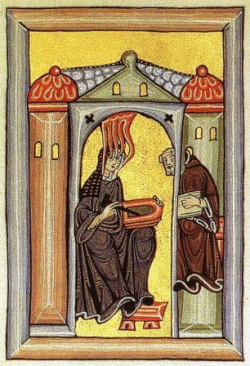Hildegard of Bingen

- Born
- Unknown
Hildegard of Bingen was a medieval mystic and visionary who was also known for her writings on medicine, health and nutrition, and nature. She is one of the earliest women for whom scientific writings still exist.
Hildegard was born in Bemersheim in Germany, the 10th child of a wealthy family. She had visions from a young age and at the age of eight, she was sent to a Benedictine monastery, where she was taught to read and write.
In 1036, she became Abbess of the convent, and moved it to Rupertsberg, where it was independent and not under the rule of a male house. This gave Hildegard considerable freedom and she travelled widely in France and Germany. She was consulted by, and advised, bishops, popes and kings.
An esteemed advocate for scientific research, Hildegarde was one of the earliest promoters of the use of herbal medicine to treat ailments.
At the time, Benedictine monasteries were often the last refuge of the sick, and Hildegard spent time working in, and then leading, the herbal garden and infirmary.
At a time when few women wrote, Hildegard produced texts on many topics, including theology, medicine and natural history, and she also composed music. In later centuries, early feminists used her writings to argue for women’s right to attend medical school. Among her medical texts are Physica, later known as the Book of Simple Medicine. This describes the medicinal uses of more than 200 plants, stones, fish, reptiles and other animals. Causea et Curae, or Book of Compound Medicine, covered the causes and cures of many diseases, symptoms to look for, the place of humanity in the world and the theory of humours, prevalent in medicine at the time. Unlike her other writings, these books do not contain references to divine sources, but they do reflect her belief that man was the peak of God’s creation and that everything was put in the world for man to use.
Hildegard is also reported to be the first person to write about the need to boil drinking water for sanitation, and she emphasised the importance of exercise and diet.



